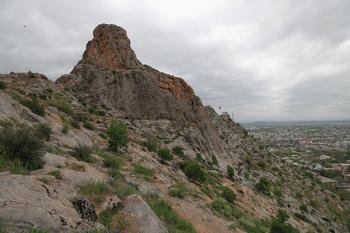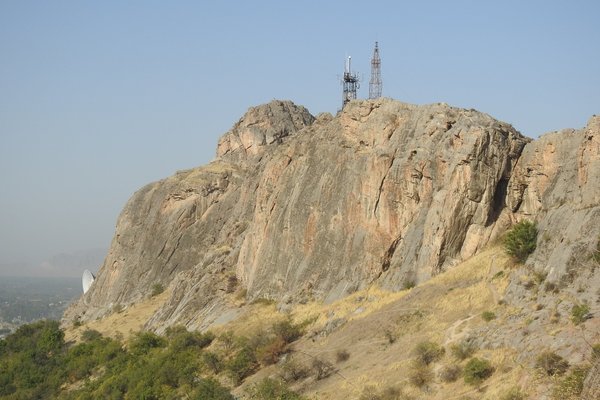Kyrgyzstan
Sulaiman-Too
Sulaiman-Too Sacred Mountain is a sacred mountain originating from pre-Islamic times.
The cult practices for mountain worship have been continuing here for thousands of years, and have been absorbed by Islam. The mountain has a height of ca. 200m and overshadows the city of Osh. On it, Stone and Bronze Age settlements, petroglyphs, ritual sites and Islamic buildings can be found.
Community Perspective: the walk on the network of traditional pilgrim paths is considered enjoyable, and you will meet many locals doing their daily rounds and seek for blessings. However, the Soviet-style museum carved into the mountain is disturbing and the petroglyphs are damaged by graffiti.
Site Info
Official Information
- Full Name
- Sulaiman-Too Sacred Mountain (ID: 1230)
- Country
- Kyrgyzstan
- Status
-
Inscribed 2009
Site history
History of Sulaiman-Too
- 2009: Inscribed
- Inscribed
- 2008: Referred
- Threats to the site (aerial ropeway, mosque, housing)
- 2007: Referred
- WHC recommends to complete management plan and protection, extend the buffer zone and put in place a tourism strategy.
- Type
- Cultural
- Criteria
- iii
- vi
Links
- UNESCO
- whc.unesco.org
- Official
-
- kyrgyzjer.com — Osh region tourism
- Related
-
- caravanistan.com — Caravanistan: The Silk Road Travel Guide
All Links
UNESCO.org
- whc.unesco.org — whc.unesco.org/
Official Website
- kyrgyzjer.com — Osh region tourism
Related Resources
- caravanistan.com — Caravanistan: The Silk Road Travel Guide
News Article
- July 12, 2009 eng.24.kg — Celebrations devoted to inclusion of Sulaiman-Too in UNESCO World Heritage List to run in Osh
- July 12, 2009 eurasianet.org — Osh's Sulaiman Too mountainhas been declared Kyrgyzstan's first UNESCO World Heritage Site
Community Information
- Community Category
- Cultural Landscape: Relict
Travel Information
Recent Connections
-
Contains significant structures from the 20th Century
The Mosque of Mohammed Yusuf Bai Haji O…
-
Untranslated Toponyms
"Too" = "Mountain" in Kyrgyz. and share… -
Shamanism
Today, rituals and prayers connected wi…
Connections of Sulaiman-Too
- Individual People
-
-
King Solomon
"The modern name related to a Muslim legend about stay of the prophet Sulaiman, or the Bible Solomon in Arabian sources, at the mountain." (Nomination document)
-
- Trivia
-
-
On Banknotes
At the 1,000 Som noteSee en.wikipedia.org
-
- History
-
-
Contains significant structures from the 20th Century
The Mosque of Mohammed Yusuf Bai Haji Ogli (Boqiy), dating from 1909-1910
-
Silk Roads
Classic Land Route; "In mediaeval times Osh was one of the largest cities of the fertile Fergana valley at the crossroads of important routes on the Central Asian Silk Roads system, and Sulaiman-Too was a beacon for travellers." (AB ev) -
Bronze Age
Bronze Age settlement -
Mughal Empire
Babur, founder of the Mughal dynasty, is said to have built a small mosque here in 1510
-
- Architecture
- World Heritage Process
-
-
First inscriptions
Kyrgyzstan 2009 -
Slow Starters
2009 - 1995 : 14 years
-
- Religion and Belief
-
-
Mithraism
"There is material to suggest that the earliest cult of Sulaiman-Too could be Mithraism. Mithra, one of the most ancient Indo-Arian gods, was later included in the Zoroastrian pantheon." (AB evaluation) -
Legends and Folk Myths
Women who ascend to the shrine on top and crawl though an opening across the holy rock will, according to legend, give birth to healthy children. (Wiki) -
Notable mosques
Two largely reconstructed 16th century mosques -
Islamic pilgrimage sites
Sulaiman-Too is the main holy and pilgrimage site for Muslims of southern Kyrgyzstan and the Ferghana Valley -
Shamanism
Today, rituals and prayers connected with domestic animal sacrifice, shamanism ideas of fertility, ancestors’ cults or magic treatments are still practiced at the cult sites. (AB ev) -
Sacred Mountains
-
- Human Activity
-
-
Petroglyphs
-
Irrigation and drainage
In the Middle Ages irrigation channels from the Ak-Buura River were created along the lower slopes, and one of them is still functioning on the northern side (AB ev)
-
- Timeline
-
-
Built in the 2nd Millennium BC
"a symbiosis of various cultures and traditions for more than three millennia" and "The majority of images belong to the Bronze Age (circa 1500 BC to circa 500 AD)" (AB ev)
-
- WHS Names
-
-
Untranslated Toponyms
"Too" = "Mountain" in Kyrgyz. and shares a root of "tağ" with other Turkic languages as in "Nemrut Dag". -
Named after a Mountain
Sulayman Mountain - ca. 200 m -
Named after individual people
A 16th century moslem prophet named Sulayman
-
News
- eng.24.kg 07/12/2009
- Celebrations devoted to inclusion …
- eurasianet.org 07/12/2009
- Osh's Sulaiman Too mountainhas bee…
Recent Visitors
Visitors of Sulaiman-Too
- Adrian
- Adrian Turtschi
- Alexander Lehmann
- Alexander Parsons
- A. Mehmet Haksever
- Ammon Watkins
- Ana
- Ask Gudmundsen
- Aspasia
- Atila Ege
- Bill Maurmann
- Bram de Bruin
- christof
- David Marton
- Els Slots
- Erik Jelinek
- Evgenii
- fedemarch92
- henryjiao18
- hotpickle
- Iain Jackson
- Ivan Rucek
- Jakubmarin
- Jarek Pokrzywnicki
- Jawnbeary
- jonas
- Jon Opol
- Juha Sjoeblom
- KarenBMoore
- Knut
- Loic Pedras
- Maciej Gil
- Maciej Gowin
- marcel staron
- Marcobrey
- Martin
- Martina Rúčková
- Mathijs
- Michael Turtle
- Mihai Dascalu
- Mikko
- Milan Jirasek
- Miloš Tašković
- Nihal Ege
- Philipp Leu
- Piotr Wasil
- Rahelka
- Reza
- rivr
- Roman Bruehwiler
- Samy G
- Sergio Arjona
- Shannon O'Donnell
- Slavi
- Solivagant
- Stanislaw Warwas
- Szucs Tamas
- Tatiana Nikulnikova
- Thomas Buechler
- Timothy C Easton
- Tinamu
- Truls Brekke
- Walter
- Westwards
- Wojciech Fedoruk
- Xiquinho Silva
- Yevhen Ivanovych
- zfish
Community Reviews
Show full reviews
Sulaiman-Too is the landmark of the lovely city of Osh. It is a mostly relict cultural landscape of a sacred mountain – so much was destroyed during the Soviet-communist period of Kyrgyzstan, that really only the caves and the legends remain. A few recently revived or added Islamic buildings can be found at the foot of the mountain, outside the gates, including the pretty, Arab-sponsored Sulaiman-Too Mosque dating from 2012.
Accurate information on how to visit the mountain is surprisingly rare to find. One can actually enter from two sides: where the English language sources seem to steer you to the steep stairs from Kurmanjan Datka Street, the locals generally use the winding way up from Gapar Aytiev. A handy overview map and a larger car parking can be found at that entrance.
There’s a fence fully encircling the mountain, I guess to avoid rough sleepers. A 20 Som entrance fee is only levied from 9 a.m. onwards: there’s a ticket kiosk at either entrance. I entered at 8.45 and found the gate open. I also encountered people coming from the other side, they must have been on their way from around 8. So I guess opening hours are between 8 a.m. and sunset.
Local people seem to do this walk along the ridge of the mountain as a daily exercise. The easy path has an iron railing and is largely made of cement. Here and there you can still see the original pilgrim's path: worn, marble-like …
Keep reading 0 comments
Site visited April 2014. Osh was the last stop on my tour in Kazakhstan and Kyrgyzstan. In Osh I wanted to see what the Sulaiman-Too or Sulayman Mountain is all about. In retrospect, one of the most memorable things on this whole tour was the actual journey from Bishkek to Osh. It is also one of my fondest travel memories.
In Bishkek I hopped on a Osh bound marshrutka. At first I waited for two hours for minivan to get full. The driver told that the journey would last nine hours but it ended to be an excruciating 13 hours. There were stunning views when we drove through the passes and up to the mountains. It was exiting to travel with six Kyrgyz who didn't share any common language with me. Along the road we stopped in some restaurants and also in one home. In the middle of the night the driver played music on car stereo so loud that I couldn’t sleep at all. But the music didn’t seem to bother a Kyrgyz granny who snored on the front seat. After a sleepless night it was a relief when I saw Sulaiman-Too in the horizon at six o’clock in the morning.
I had one whole day in Osh and that was a good one. Despite of being somewhat Sovietized, Osh is a city with a real Central Asian feel with its lively atmosphere and bustling bazaars. Sacred Mountain is the centerpiece of this old Silk Road city. It is …
Keep reading 0 comments
Visited during a sunny day in April.
The site is located in city Osh not far from the border with Uzbekistan. The site in fact are five linked hills in the middle of the city. The city is located in a flat area so the Sulaiman-too is visible from far away.
The hills itself are quite steep, so you have to climb a bit.
This hill is sacred and it is still used as a place of worship on various places in the area. Most famous is a stone where you have to slide down if you want to heal your back. There are various places for other healing - arms, eyes and other illnesses
Beneath the hill is a huge mosque and an Islamic cemetery. On the top of the hill there is a small mosque linked to first Mughal - Babur.
The petroglyphs are in danger by the people who are covering them by graffiti.
There are various caves, which can be visited.
I visited two museums in site - both are interesting, majority of the descriptions are in russian.
It was a nice experience to visit the site, as it is a living site with full of pilgrims or people seeking healing.
I enjoyed the stay, as well to see the city of Osh with its bazaar.
Keep reading 0 comments
